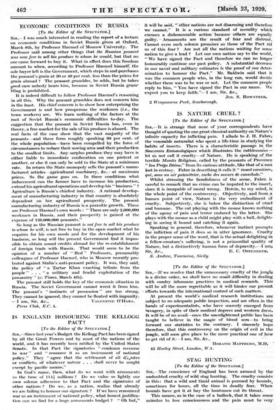ECONOMIC CONDITIONS IN RUSSIA
[To the Editor of the SPEcTkrort.1 •
SIR, I was much interested in reading the report of a lecture on economic conditions in Soviet Russia given at Oxford, March 8th, by Professor Haensel of Moscow University. The Professor said among other things that Me Russian peasant was now free to sell his produce to whom he would, but that no one came forward to buy it. What in effect does this freedom amount to when, according to Professor Haensel himself; the sole buyer left is the Government, which steps in and purchases the peasant's grain at 30 or 40 per cent. less than the prices for grain abroad ? The peasant grumbles, he adds, but he takes good care nobody hears him, because in Soviet Russia grum- bling is prohibited.
It is indeed difficult to follow Professor Haensel's reasoning
in all this. Why the peasant grumbles does not concern him in the least. His chief concern is to show how enterprising the Government is and how prosperous the workmen (i.e., the town workers) are. We learn nothing of the factors at the root of Soviet Russia's economic difficulties to-flay. The suggestion that the peasant in Soviet Russia has, even in theory, a free *narket for the sale of his produce is absurd. The real facts of the case show that the vast majority of the peasants—and these form roughly speaking 90 per cent. of the whole population—have been compelled by the force of: circumstances to reduce their sowing area and their production to the smallest limits. Any surplus produce they may have is either liable to immediate confiscation on one pretext or another, or else it can only be sold to the State at a minimum rate. In return the State monopoly sells the peasant's manu- factured articles—agricultural machinery,. &O.---Ht maximum prices. So the game goes on. In these conditions what inducement can the farmer have to increase. his production, extend his agricultural operations and develop his " business " ? Agriculture is Ittsia's chiefest industry. A rational develop- ment of manufacturing industry in that country is absolutely. dependent on her agricultural prosperity. The present manufacturing industry of Russia is a parasitic growth. These are Professor Haensel's own words : " There are only 2,000,000 workmen in Russia, and their prosperity is gained at the expense of 120,000,000 peasants."
So long as the Russian peasant is not free to sell his produce to whom he will, is not free to buy in the open market what he requires for his own needs and for the development of his business, so long will the present Government find it impos- sible to obtain sound credits abroad for the re-establishment of foreign trade with Russia. That would seem -to be the opinion of a number of " Red " Professors, presumably colleagues of Professor Haensel, who in Moscow recently pro- tested against Stalin's anti-peasant policy. It was, they said, the policy of " a Tartar Khan exacting tribute from the people " . . . " a military and feudal exploitation of the' peasantry " (v. Times, March 4th).
The peasant still holds the key of the economic situation in Russia. The Soviet Government cannot wrest it from him. The peasant's instincts of possession " are too strong. They cannot be ignored, they cannot be flouted with impunity.
















































 Previous page
Previous page